Daniel Defoe
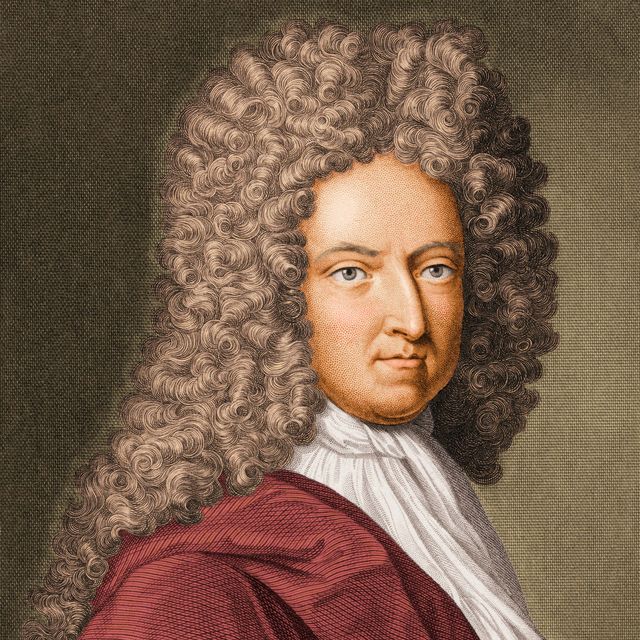
(1660-1731)

Who Was Daniel Defoe?
Daniel Defoe became a merchant and participated in several failing businesses, facing bankruptcy and aggressive creditors. He was also a prolific political pamphleteer which landed him in prison for slander. Late in life he turned his pen to fiction and wrote Robinson Crusoe , one of the most widely read and influential novels of all time.
Daniel Foe, born circa 1660, was the son of James Foe, a London butcher. Daniel later changed his name to Daniel Defoe, wanting to sound more gentlemanly.
Defoe graduated from an academy at Newington Green, run by the Reverend Charles Morton. Not long after, in 1683, he went into business, having given up an earlier intent on becoming a dissenting minister. He traveled often, selling such goods as wine and wool, but was rarely out of debt. He went bankrupt in 1692 (paying his debts for nearly a decade thereafter), and by 1703, decided to leave the business industry altogether.
Acclaimed Writer
Having always been interested in politics, Defoe published his first literary piece, a political pamphlet, in 1683. He continued to write political works, working as a journalist, until the early 1700s. Many of Defoe's works during this period targeted support for King William III, also known as "William Henry of Orange." Some of his most popular works include The True-Born Englishman, which shed light on racial prejudice in England following attacks on William for being a foreigner; and the Review , a periodical that was published from 1704 to 1713, during the reign of Queen Anne, King William II's successor. Political opponents of Defoe's repeatedly had him imprisoned for his writing in 1713.
Defoe took a new literary path in 1719, around the age of 59, when he published Robinson Crusoe , a fiction novel based on several short essays that he had composed over the years. A handful of novels followed soon after—often with rogues and criminals as lead characters—including Moll Flanders , Colonel Jack , Captain Singleton , Journal of the Plague Year and his last major fiction piece, Roxana (1724).
In the mid-1720s, Defoe returned to writing editorial pieces, focusing on such subjects as morality, politics and the breakdown of social order in England. Some of his later works include Everybody's Business is Nobody's Business (1725); the nonfiction essay "Conjugal Lewdness: or, Matrimonial Whoredom" (1727); and a follow-up piece to the "Conjugal Lewdness" essay, entitled "A Treatise Concerning the Use and Abuse of the Marriage Bed."
Death and Legacy
Defoe died on April 24, 1731. While little is known about Defoe's personal life—largely due to a lack of documentation—Defoe is remembered today as a prolific journalist and author, and has been lauded for his hundreds of fiction and nonfiction works, from political pamphlets to other journalistic pieces, to fantasy-filled novels. The characters that Defoe created in his fiction books have been brought to life countless times over the years, in editorial works, as well as stage and screen productions.
QUICK FACTS
- Name: Daniel Defoe
- Birth Year: 1660
- Birth City: London
- Birth Country: United Kingdom
- Gender: Male
- Best Known For: English novelist, pamphleteer and journalist Daniel Defoe is best known for his novels 'Robinson Crusoe' and 'Moll Flanders.'
- Fiction and Poetry
- Journalism and Nonfiction
- Academy at Newington Green
- Death Year: 1731
- Death date: April 24, 1731
- Death City: London
- Death Country: United Kingdom
CITATION INFORMATION
- Article Title: Daniel Defoe Biography
- Author: Biography.com Editors
- Website Name: The Biography.com website
- Url: https://www.biography.com/authors-writers/daniel-defoe
- Access Date:
- Publisher: A&E; Television Networks
- Last Updated: October 26, 2021
- Original Published Date: April 2, 2014
Watch Next .css-smpm16:after{background-color:#323232;color:#fff;margin-left:1.8rem;margin-top:1.25rem;width:1.5rem;height:0.063rem;content:'';display:-webkit-box;display:-webkit-flex;display:-ms-flexbox;display:flex;}

Famous British People

Mick Jagger
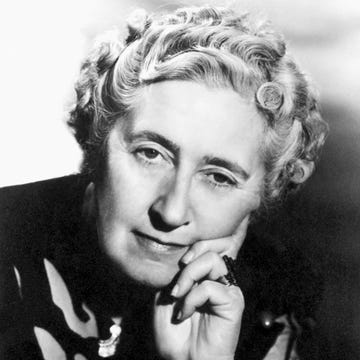
Agatha Christie

Alexander McQueen
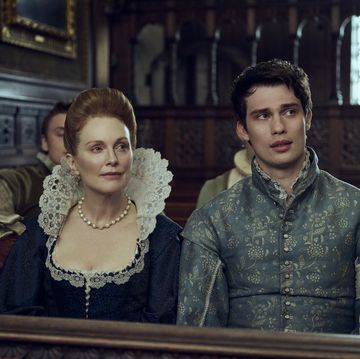
The Real Royal Scheme Depicted in ‘Mary & George’

William Shakespeare

Anya Taylor-Joy

Kate Middleton, Princess of Wales

Kensington Palace Shares an Update on Kate
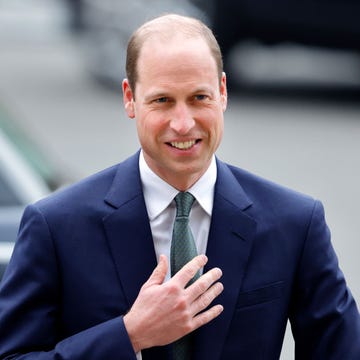
Prince William
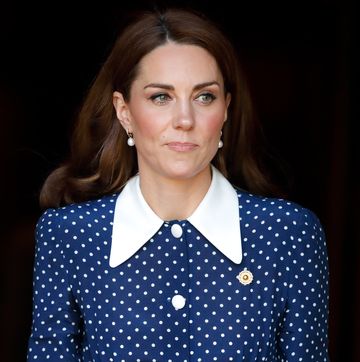
Where in the World Is Kate Middleton?
- World Biography
Daniel Defoe Biography
Born: 1660 London, England Died: April 24, 1731 London, England English writer, journalist, and poet
Daniel Defoe was the first of the great eighteenth-century English novelists. He wrote more than five hundred books, pamphlets, articles, and poems.
Education, marriage, and early career
Little is known about the birth and early childhood of Daniel Defoe, as no baptism record exists for him. It is likely that he was born in London, England, in 1660. James Foe, his father, was a butcher by trade and also a Protestant Presbyterian (considered to be a person who thought differently and did not believe in or belong to the Church of England). (Daniel Defoe added the De to his original last name Foe when he was forty.) He had a sister, Elizabeth, who was born a year earlier. When he was ten, his mother died. He had early thoughts of becoming a Presbyterian minister, and in the 1670s he attended the Reverend Charles Morton's famous academy near London.
In 1684 Defoe married Mary Tuffley, who brought him the handsome dowry of 3,700 pounds. They had seven children. Defoe participated briefly in the Monmouth Rebellion of 1685, a Protestant uprising, but escaped capture and punishment. From 1685 through 1692 he engaged in trade in London as a wholesale hosiery agent, an importer of wine and tobacco, and part owner and insurer of ships.
Defoe evidently did business with King William III (1650–1702). He suffered losses from underwriting marine insurance for the king and was forced to declare bankruptcy in 1692. Although he settled with the people to whom he owed money in 1693, he faced the threat of bankruptcy throughout his life and faced imprisonment for debt and libel (the crime of writing or publishing untrue statements that harm other people) seven times.
Journalist and secret agent
Arrested in 1703 for having published The Shortest Way with the Dissenters in 1702, Defoe was tried and sentenced, put before public abuse, and taken to prison. Robert Walpole (1676–1745) released him five months later and offered him a post as a government agent. Defoe continued to serve the government as journalist, pamphleteer, and secret agent for the remainder of his life. The most long-lived of his twenty-seven periodicals, the Review (1704–1713), was especially influential in promoting the union between England and Scotland in 1706 and 1707 and in supporting the controversial Peace of Utrecht of 1713 (one of the greatest peace settlements in history that balanced power in Europe).
His nonfiction—essays, poems
Defoe published hundreds of political and social documents between 1704 and 1719. His interests and activities reflect the major social, political, economic, and literary trends of his age. He supported the policies of William III and Mary after the Glorious Revolution of 1688 and 1689, and analyzed England's growth as the major sea and mercantile (having to do with merchandise and trade) power in the Western world. He pleaded for sympathy for debtors and defended the rights of Protestant dissenters (people who opposed the beliefs of the Church of England). He used newspapers and journals to make his points.
His first major work, An Essay upon Projects (1697), proposed ways of providing better roads, insurance, and education to be supported by "a Tax upon Learning, to be paid by the Authors of Books." Many of these topics reappeared in his later works.
In 1701 Defoe published The True-Born Englishman, the most widely sold poem in English up to that time. He estimated that more than eighty thousand copies of this defense of William III against the attacks of John Tutchin were sold. Although Defoe's The Shortest Way with the Dissenters (1702), which ridiculed the harshness of the Church of England, led to his arrest, the popularity of his Hymn to the Pillory (1703) indicated the favor that he had found with the London public.
Robinson Crusoe
At the age of fifty-nine, after a full career as businessman, government servant, political pamphleteer, and journalist, Defoe began a career as novelist. Within six years he produced six novels, all of which gave him his greatest fame.

Other major fiction
Defoe published comparatively little in 1721, because he was hard at work on the three major books that were to appear the following year. In January 1722 he published The Fortunes and Misfortunes of the Famous Moll Flanders, probably the most successful of his novels. A Journal of the Plague Year, issued in March 1722, presented a picture of life in London during the Great Plague of 1665; it was thought to be history rather than fiction for more than a hundred years. His third novel, The History and Remarkable Life of the Truly Honourable Col. Jacque, was published in December 1722.
In 1724 and 1725 Defoe published four successful books, each displaying his characteristically clear, strong English words. The Fortunate Mistress; or, … Roxana was the first of three in 1724. The second, A Tour Thro' the Whole Island of Great Britain was one of the most thorough guidebooks of the period, and the third, The History of the Remarkable Life of John, was one of his finest criminal biographies. The True and Genuine Account of the Life and Actions of the Late Jonathan Wild was the fourth book, published in 1725.
Last Works and death
Although he continued to write, only a few of Defoe's later works are worthy of note: The Complete English Tradesman (1725), The Political History of the Devil (1726), A New Family Instructor (1727), and Augusta Triumphans (1728), which was Defoe's plan to make "London the most flourishing City in the Universe."
Daniel Defoe died at age seventy-one on April 24, 1731, outside of London, England.
For More Information
Hunter, J. Paul. The Reluctant Pilgrim. Baltimore, MD: Johns Hopkins Press, 1966.
Moore, John Robert. A Checklist of the Writings of Daniel Defoe. Bloomington: Indiana University Press, 1960.
Secord, Arthur W. Studies in the Narrative Method of Defoe. Urbana: University of Illinois Press, 1924.
Trent, William P. Daniel Defoe, How to Know Him. Indianapolis: Bobbs-Merrill, 1916. Reprint, New York, Phaeton Press, 1971.

User Contributions:
Comment about this article, ask questions, or add new information about this topic:.
The Defoe Society
About daniel defoe, daniel defoe (1660-1731).
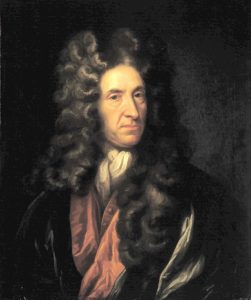
Although Defoe is best known now for his novels, much of his writing is related to political, social, and business issues. This is evident in his early writing. One of his first works, An Essay upon Projects (1697), was a series of proposals that touched on such topics as banking, highway maintenance, education, and insurance. Defoe also wrote about contemporary religious issues, and was charged with libel for one pamphlet that responded to a proposed bill to outlaw occasional conformity, The Shortest Way with the Dissenters (1702). Part of his punishment was to stand in the pillory, a potentially dangerous sentence as it left the prisoner vulnerable to the whims of the mob. However, Defoe’s friends turned the public punishment into an opportunity; not only did they stand around him as he stood in the device, but the occasion was used to sell his Hymn to the Pillory, a poem that ridicules the justice system, to the public.
Defoe’s concern about socio-political matters frequently intersected with his love of literature, and he began publishing poetic works that dealt with issues of public concern. His remarkable True-Born Englishman (1701), for example, is a satiric poem written to defend King William III, who had been frequently criticized for his foreign upbringing. What right, Defoe suggests in the poem, do the English people, themselves a rag-tag group of nationalities, have to criticize those who are from elsewhere? Another of his writing ventures was a newspaper, The Review, which was, as Paula R. Backscheider has recently noted, a “ground-breaking periodical that moved English journalism in new directions” (Online DNB).
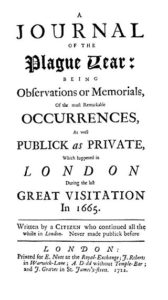
As Defoe wrote the works that we are most familiar with now— Robinson Crusoe (1719), Captain Singleton (1720), Moll Flanders (1722), Colonel Jack (1722), Journal of the Plague Year (1722), and Roxana (1724)—he was also producing numerous innovative texts in widely varied genres and on very different themes. For example, alongside the significant number of political pamphlets and essays produced, he published travel literature, such as The Tour thro’ the Whole Island of Great Britain (1724-6), commentaries on religion, such as the satirical Political History of the Devil (1726), and self-help manuals, like The Family Instructor (1715).
Defoe scholarship has been vibrant and exciting for many decades, but there is much left to do. Backscheider has recently reminded us that less than a quarter of Defoe’s works are currently in print, a dilemma that scholars are currently working to resolve. And there are continually exciting new avenues opening up through which we can approach Defoe’s corpus. It is the objective of this society to find creative new ways to facilitate this scholarship and to open new avenues of collaboration.
This entry has only briefly touched on a few key facts about Daniel Defoe. There are numerous superb scholarly biographies on Defoe and his work that will allow you to explore at greater length his life, and the impressive variety of his work, both in terms of subject matter and genre. You might start with some of the following, to which I am indebted for this brief biography. They are listed in order of the date of publication, starting with the most recent:
- P. N. Furbank and W. R. Owens. A Political Biography of Daniel Defoe . London: Pickering & Chatto, 2006.
- John Richetti. Life of Daniel Defoe: A Critical Biography . Oxford: Blackwell Publishers, 2005.
- Maximillian E. Novak. Daniel Defoe: Master of Fictions: His Life and Ideas . Oxford: Oxford University Press, 2001.
- Backscheider, Paula R. Daniel Defoe: His Life . Baltimore: Johns Hopkins University Press, 1989.
For those with access to the online Oxford Dictionary of Biography, you might also want to check out its excellent, brief biography of Defoe, contributed by Paula R. Backscheider.
Daniel Defoe
Daniel Defoe was born on the 3 rd of September, in 1660 in the city of London , England. He was a bright son of James Foe, a butcher by profession, and his mother, Annie, was a housewife. In his early years, he witnessed some of the unfortunate occurrences of history: The Great Plague of London and The Great Fire of London, which left only a handful of houses in his area. These events shaped his personality insignificantly. Daniel’s mother passed away when he was ten years old.
Since his father was a Presbyterian dissenter, he could not afford to send his son to the public educational institutions of England. Daniel started his educational journey from the Rev. James Fisher’s boarding school, located in Dorking, Surrey. Aged fourteen, he was sent to Charles Morton’s dissenting academy, where he studied humanities and science. There, he also prepared himself to become a Presbyterian minister. Thus, he received less formal education with no intention of becoming a writer in the future, yet with his priceless experiences and unique literary abilities, he mesmerized the generations later.
Although Daniel Defoe produced remarkable pieces to treat his readers, his final years witnessed constant onslaughts of troubles and struggles. He was pushed and hunted by his old creditors until his sad demise. This iconic figure lost the battle of his life on the 24 th of April, in 1731 and was interred in Bunhill Fields.
Some Important Facts of His Life
- Young Defoe married Mary Tuffley at the age of twenty-four in 1684 and the couple had had eight children.
- After the publication of his satirical work “The Shortest Way with Dissenters” he was imprisoned in May 1703 and charged within three days. However, he was released shortly.
- He is widely acclaimed for his work, Robinson Crusoe .
- He is said to have used at least 198 pennames.
Daniel Defoe successfully pursued two careers in life: first, he became a businessman and later enjoyed an esteemed life as a poet and writer. He entered the world of business in his teens dealing in different products such as wine, general woolen goods, and hosiery. A man with high ambitions, Defoe, had bright plans for the future, but unfortunately, luck did not favor him, and he was forced to declare bankruptcy in 1692. Soon after setting up another business, his interest in trade and politics grew stronger. Keepings the political scenario and his experiences in his view, he turned toward writing and his first writing attempt appeared in 1683.
Later, waving through the political instabilities prevalent in his country, he came up with his witty and vigorous poem “The True-Born Englishman” which proved an immediate success. Later, in 1702, his most skillful and famous pamphlet “The Shortest-Way with the Dissenters” was published anonymously. Although the work earned huge success, the style and content became the reason for his misery; he was arrested soon after the publication. Later in his life, he intended to extend his writing talent to the work of prose fiction and came up with a big hit , Robinson Crusoe . The book provides honest insight into human nature. It introduced him as the finest novelist of his age. Later in 1724, he published Roxana . His other notable works include Captain Singleton, Memoirs of a Cavalier, and A Journal of the Plague Year.
Daniel Defoe enjoyed a successful literary life. His trade experiences, political passions, and the personal tragedies he encountered during his early years played a pivotal role in his writing career. Using his unique style, he beautifully portrayed his ideas in his literary pieces. Although the satirical style and harsh tone of his political and religious pamphlets annoyed the ruling class, yet he continued presenting the true picture of his time in his writings. For example, his much-appreciated work, Robinson Crusoe , presents the realistic projection of the human psyche and emotion. Marked with the use of reflective tone, satirical style, irony , symbolism , and metaphors , his works won universal recognition. The recurring themes in most of his writings are prejudice, politics, religion, and human nature.
Some Important Works of Daniel Defoe
- Best Novels: Some of his best novels include Robinson Crusoe , Captain Singleton, Moll Flanders, Roxana, and Memoirs of a Cavalier.
- Other Works: Besides writing novels, he tried his hands on other genres , too. Some of them include “The Poor Man’s Plea”, “Giving Alms No Charity, “Employing the Poor, An Appeal to Honour and Justice , Tho’ it be of His Worst Enemies, Parochial Tyranny”, “An Essay Upon Literature” and “The Political History of the Devi”l.
Daniel Defoe’s Impact on Future Literature
Daniel Defoe’s writing style and literary qualities of his masterpieces brought praiseworthy changes in the global English literature years later him. His distinctive writing approach and unique expression have made him stand among the best historical fiction writer of his time as well as the later times. Also, his political passion and views regarding legitimacy and power had a significant influence on a diverse range of writers and other influential figures. He is so much popular at this time that intertextualities have made it easy for other writers to allude to him in every other novel they create.
Important Quotes
- “Those people cannot enjoy comfortably what God has given them because they see and covet what He has not given them. All of our discontents for what we want appear to me to spring from want of thankfulness for what we have.” ( Robinson Crusoe )
- “It put me upon reflecting how little repining there would be among mankind at any condition of life, if people would rather compare their condition with those that were worse, in order to be thankful, than be always comparing them with those which are better, to assist their murmurings and complaining.” ( Robinson Crusoe )
- “…in the course of our lives, the evil which in itself we seek most to shun, and which, when we are fallen into, is the most dreadful to us, is oftentimes the very means or door of our deliverance, by which alone we can be raised again from the affliction we are fallen into…” ( Robinson Crusoe )
- “And I add this part here, to hint to whoever shall read it that whenever they come to a true sense of things, they will find Deliverance from Sin a much greater Blessing than Deliverance from Affliction.” ( Robinson Crusoe )
Related posts:
- Robinson Crusoe
Daniel Defoe
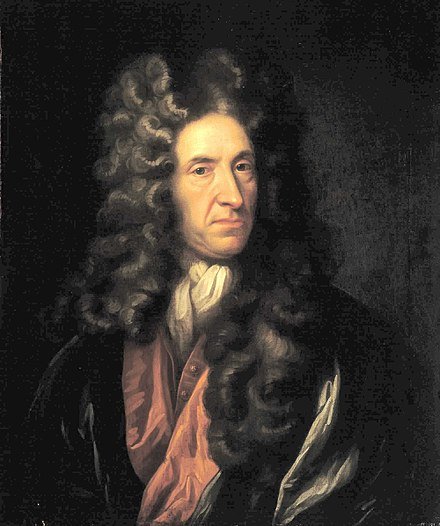
A Literary Giant and his Enduring Legacy in British Heritage.
Contribution to British Heritage
Success and general information.
Born as Daniel Foe around 1660, he later adopted the more aristocratic-sounding "De" to his name. The exact date and place of his birth are uncertain, but it is believed he was born in London, witnessing some of the most significant historical events of his era, such as the Great Plague of London in 1665 and the Great Fire of London in 1666. Defoe's education was marked by his upbringing in a Presbyterian dissenting family. He attended dissenting academies and received a well-rounded education. His early career involved ventures into various trades, including hosiery, wool goods, and wine, though he often faced financial struggles and debts. His writing career took off with his notable publication, "An Essay Upon Projects" in 1697, which proposed ideas for social and economic improvements. He then delved into political and religious pamphlets, earning attention from intellectuals and political leaders. However, his outspokenness and controversial writings led to periods of trouble with the authorities, even facing imprisonment and a public pillory for his pamphlet "The Shortest-Way with the Dissenters." Defoe's intelligence and skills as a writer did not go unnoticed, and he became a secret agent and intelligence operative for the government, particularly during the reign of William III and Queen Anne. His works often supported the political agenda of the government and influenced public opinion on significant matters, including the Acts of Union in 1707.
Contribution to British Heritage: "Robinson Crusoe" and the English Novel
Undoubtedly, Daniel Defoe's most enduring contribution to British heritage lies in his novel "Robinson Crusoe." This iconic work, published in 1719, has captivated readers for generations and remains an essential part of English literature. The novel's protagonist, Robinson Crusoe, becomes marooned on a desert island after a shipwreck and must rely on his ingenuity and resilience to survive and adapt to his new environment.
The tale of survival, exploration, and self-discovery in "Robinson Crusoe" struck a chord with readers from various backgrounds, transcending geographical and cultural boundaries. The novel's universal themes of isolation, human resourcefulness, and the struggle against adversity resonated with readers, making it a timeless classic.
"Robinson Crusoe" is often regarded as one of the earliest examples of the English novel. Defoe's innovative use of first-person narrative and realistic, detailed descriptions of everyday life on the island broke away from the prevalent literary forms of the time. By grounding the story in a plausible setting and emphasizing the protagonist's inner thoughts and emotions, Defoe paved the way for the development of the modern novel. Moreover, "Robinson Crusoe" demonstrated the potential of fiction to entertain and educate simultaneously. The novel's didactic elements, highlighting the importance of hard work, self-reliance, and spiritual reflection, appealed to a broad readership. As a result, the novel contributed to the rising popularity of the English novel and paved the way for future novelists to explore a wide range of themes and styles.
Legacy and Influence on British Heritage
Daniel Defoe's literary legacy goes beyond "Robinson Crusoe." His versatility as a writer, producing works on politics, economics, religion, and society, showcased his keen intellect and ability to engage with a wide range of topics. His works remain valuable sources for historians studying the political and social climate of his time. Defoe's influence on British heritage can also be seen in his contributions to journalism. His periodicals, such as "A Review of the Affairs of France," displayed a keen understanding of international politics and economic affairs. Defoe's writing in these publications provided insights into the geopolitical landscape of the 18th century and contributed to a more informed British public. Furthermore, Defoe's fictional works, particularly "Moll Flanders" and "Roxana: The Fortunate Mistress," challenged traditional notions of femininity and gender roles in 18th-century British society. These novels offered complex and morally ambiguous portrayals of female characters, which was a departure from conventional depictions of women in literature at the time. As such, Defoe's work played a role in expanding the scope of women's representation in British literature. In conclusion, Daniel Defoe's enduring legacy in British heritage lies in his contributions to the English novel through his masterpiece "Robinson Crusoe," his impact on journalism, and his exploration of unconventional themes in his fictional works. Defoe's literary achievements and influential ideas have secured his place as a prominent figure in British literature and cultural history. His works continue to be celebrated, studied, and appreciated by readers and scholars alike, ensuring that his legacy remains vibrant and relevant in the annals of British heritage.
- Daniel Defoe en.wikipedia.org
You might also like
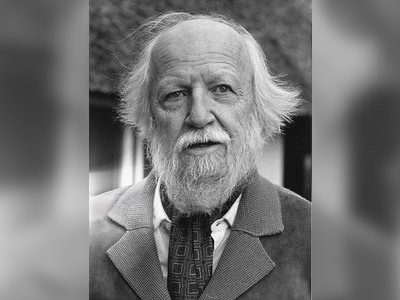
- International edition
- Australia edition
- Europe edition
Not your typical killjoy Puritan
H ere is a gift for a biographer: a great novelist whose life was a seething broth of drama and contradiction. Daniel Defoe , creator of the insouciantly naughty Moll Flanders, nevertheless applauded the Scots for hanging adulterers. A deeply religious and highly principled man, he made his immortal Robinson Crusoe a slave-trader, and saw nothing wrong in the barter of human lives.
Defoe rose to be a friend and confidant of monarchs, and plummeted to the disgrace of Newgate Prison and the pillory. He was a comic genius, a spy, a failed businessman, a magnificent journalist. A few pages into Richard West's superb The Life and Strange Surprising Adventures of Daniel Defoe, one wonders why Defoe is not a more significant figure in our cultural history. West hints that this might be because he chose the less photogenic side of the great divide between the state church and Protestant Nonconformists; the chasm opened by the Reformation, whose outlines are still visible.
Seventeenth-century Puritans, even today, do not get a good press. Popular history tends to write them off as narrow, punitive killjoys, overlooking their influence in the Glorious Revolution of 1688 which surely merits a round of applause. Perhaps some romantic, atavistic love of the wretched Stuarts lingers in our collective bloodstream, making us forget how unpleasant it would have been for this nation if we had not thrown out James II.
And the fact that some readers, all these centuries later, will disagree with the above, gives a clue to the flaming political passions of Daniel Defoe's England. West, realising the impossibility of writing about the era without stating allegiances, nails his own colours to the mast in his introduction: 'Although an Anglican, not a Dissenter, I agree with Defoe on most of the issues of his age, such as Scotland, the Hanoverian Succession and the Duke of Marlborough's war with France. I disagree with him on slavery, the conservation of forests and his hostility to the Roman Catholic Irish.'
Ironically, the early life of Daniel Defoe would have been similarly complicated had he been born (like Alexander Pope) a Catholic. Defoe was born into a Puritan London family in 1660, the year of the Restoration. Under Charles II, Dissenters were firmly barred from the establishment; kept out of Parliament and the universities by their refusal to sign the Thirty-Nine Articles of the Church of England. Defoe was, says West, rather chippy about his lack of a pukka classical education.
Political and religious outcasts turned to trade. Defoe went into the City, married (later suffering agonies of remorse at squandering his wife's handsome dowry), and set about fathering his six children. It was the accession, in 1685, of the odious James II that began Defoe's astonishing (and until now, largely unsung) contribution to English history.
To protect himself from his enemies, Defoe shrouded the details of his life in mystery. West painstakingly tweezers clues from the mass of fictional pamphlets and novels. He is almost, but not absolutely, certain Defoe joined Monmouth's rebellion in 1685, and fought at the Battle of Sedgemoor. Secrecy was essential, since captured rebels faced Judge Jeffreys at the infamous 'Bloody Assizes'.
Defoe's star rose with the arrival of William of Orange, to whom he became confidant, servant and beneficiary. King William was his lifelong hero, and may have helped him when he went bankrupt in 1692. 'It would not be too far-fetched to suggest,' writes West, 'that Defoe's bankruptcy led him to become a novelist.' Hounded by his creditors until the day he died, Defoe's stories are full of the getting and losing of fortunes. He was, to his lasting shame, no businessman.
After the death of the muscularly Protestant William, it was open season on Dissenters once again. Defoe wrote a stinging pamphlet, 'The Shortest Way With Dissenters', which got him into no end of hot water. As any other journalist could have told him, the average reader simply cannot cope with irony. 'The Shortest Way', sarcastically couched as a high Tory diatribe in favour of stringing up all Nonconformists, enraged both sides Dissenters, because they thought he was serious; Tories when they realised they were being laughed at.
After a trial at the Old Bailey, Defoe was fined and sentenced to three days in the pillory. West shows that the pillory, which now seems slightly comical, was a dangerous ordeal. Defoe, legend has it, was cheered by his supporters, and pelted with nothing worse than flowers.
He was bailed out of Newgate by Queen Anne, and recruited into the Secret Service. His mission was to travel the British Isles, taking the political temperature of each region. Somehow, he also found the time to start up his newspaper, The Review. West calculates that in the year after leaving prison, Defoe wrote half a million words.
Articles and pamphlets, often on subjects surely risky for a paid spy, poured out of him. West admits Defoe's willingness to write absolutely anything for cash, but places more emphasis on his relish for being at odds with the rest of the world: 'He was almost the only public man who belonged to no party, and wrote for no interest other than the truth.'
West evidently likes and admires his awkward subject, and his microscopic study of Defoe's huge output (confusingly often published anonymously, or under pseudonyms) yields more than missing historical facts. It is possible to see Daniel Defoe's enormous, often unacknowledged influence on succeeding generations of writers - for instance, Dickens seems to have lifted the storm scene in David Copperfield straight from Defoe's account of the Great Storm in 1703.
West's Defoe is far more than the creator of Robinson Crusoe; though that, in itself, would be enough to win him a plinth in the gallery of immortals. As Dr Johnson wrote, 'Was there ever yet anything written by mere man that was wished longer by its readers, excepting Don Quixote, Robinson Crusoe and the Pilgrim's Progress?' There is a strong sense, throughout this minutely researched, hugely entertaining book, of a writer being restored to his rightful place in the literary hierarchy.
- Biography books
- Daniel Defoe
Most viewed

IMAGES
VIDEO
COMMENTS
Daniel Defoe was an English novelist, pamphleteer, and journalist, known as the author of Robinson Crusoe (1719-22) and Moll Flanders (1722). Defoe's father, James Foe, was a hard-working and fairly prosperous tallow chandler (perhaps also, later, a butcher), of Flemish descent. By his middle 30s,
Daniel Defoe (/ d ɪ ˈ f oʊ /; born Daniel Foe; c. 1660 - 24 April 1731) was an English novelist, journalist, merchant, pamphleteer and spy. He is most famous for his novel Robinson Crusoe, published in 1719, which is claimed to be second only to the Bible in its number of translations. He has been seen as one of the earliest proponents of the English novel, and helped to popularise the ...
QUICK FACTS. Name: Daniel Defoe. Birth Year: 1660. Birth City: London. Birth Country: United Kingdom. Gender: Male. Best Known For: English novelist, pamphleteer and journalist Daniel Defoe is ...
Daniel Defoe Biography. Born: 1660 London, England Died: April 24, 1731 London, England English writer, journalist, and poet Daniel Defoe was the first of the great eighteenth-century English novelists. He wrote more than five hundred books, pamphlets, articles, and poems.
Daniel Defoe - Novelist, Journalist, Satirist: With George I's accession (1714), the Tories fell. The Whigs in their turn recognized Defoe's value, and he continued to write for the government of the day and to carry out intelligence work. At about this time, too (perhaps prompted by a severe illness), he wrote the best known and most popular of his many didactic works, The Family ...
Daniel Defoe, orig. Daniel Foe, (born 1660, London, Eng.—died April 24, 1731, London), British novelist, pamphleteer, and journalist. A well-educated London merchant, he became an acute economic theorist and began to write eloquent, witty, often audacious tracts on public affairs. A satire he published resulted in his being imprisoned in 1703 ...
Daniel Defoe Biography. D aniel Defoe was a survivor—and that's an understatement. He was young and vulnerable when an outbreak of the bubonic plague attacked England, killing hundreds of ...
You might start with some of the following, to which I am indebted for this brief biography. They are listed in order of the date of publication, starting with the most recent: P. N. Furbank and W. R. Owens. A Political Biography of Daniel Defoe. London: Pickering & Chatto, 2006. John Richetti. Life of Daniel Defoe: A Critical Biography. Oxford ...
Biography. Defoe was born Daniel Foe, probably in the parish of St. Giles Cripplegate, London. Both the date and the place of his birth are uncertain. His father, James Foe, though a member of the Butchers' Company, was a tallow chandler. Daniel later added the aristocratic sounding "De" to his name and on occasion claimed descent from the ...
Daniel Defoe. The English novelist, journalist, poet, and government agent Daniel Defoe (1660-1731) wrote more than 500 books, pamphlets, articles, and poems. Among the most productive authors of the Augustan Age, he was the first of the great 18th-century English novelists. Daniel Defoe was the son of a dissenting London tallow chandler or ...
Daniel Defoe was born on the 3 rd of September, in 1660 in the city of London, England. He was a bright son of James Foe, a butcher by profession, and his mother, Annie, was a housewife. In his early years, he witnessed some of the unfortunate occurrences of history: The Great Plague of London and The Great Fire of London, which left only a ...
Defoe had been born Daniel Foe - the French 'De' was a later affectation, used to make him sound 'more socially and upward sounding' and to suggest ties to a respected aristocratic family. He was born in around 1660, though we cannot know the date for certain. He lived through the Great Plague of 1665 which killed 100,000 people; it ...
Daniel Defoe Biography. Daniel Defoe's early life was not easy. He was born about 1660 in London to a poor, but hard-working butcher who was, in addition, a Dissenter from the Church of England. Because his father was a Dissenter, Daniel was unable to attend such traditional and prestigious schools as Oxford and Cambridge; instead, he had to ...
The Life of Daniel Defoe: A Critical Biography. John Richetti. John Wiley & Sons, Aug 17, 2015 - Biography & Autobiography - 432 pages. The Life of Daniel Defoe examines the entire range of Defoe's writing in the context of what is known about his life and opinions. Features extended and detailed commentaries on Defoe's political, religious ...
Daniel Defoe, an English writer, journalist, pamphleteer, and spy, made a profound impact on British heritage with his literary achievements and influential ideas. Defoe is best known for his iconic novel, "Robinson Crusoe," published in 1719, which remains one of the most celebrated works in English literature. Its enduring popularity and ...
Daniel Defoe was born Daniel Foe in 1660 in London, the son of a butcher (he began to use "Defoe" more frequently beginning in 1696). Defoe became a merchant but went bankrupt in 1692 and left the world of business in 1703. Defoe was an acclaimed and prolific pamphleteer and journalist who wrote scabrous attacks on supporters of King William III and Queen Anne, William's successor.
Daniel Defoe Biography. Early Life. One of three children, Daniel Defoe was born to James Foe, a butcher, and his wife Alice, in the parish of St. Giles, Cripplegate, London about 1660. It seems that Defoe's name went through various spellings: Foe, Faugh, DuFoo, Du'Foe, DeFoe, DeFooe, Dukow (a sexton's error) and Daniel Defoe, Esq.
Ironically, the early life of Daniel Defoe would have been similarly complicated had he been born (like Alexander Pope) a Catholic. Defoe was born into a Puritan London family in 1660, the year of ...
Robinson Crusoe (/ ˈ k r uː s oʊ / KROO-soh) is an English adventure novel by Daniel Defoe, first published on 25 April 1719.Written with a combination of Epistolary, confessional, and didactic forms, the book follows the title character (born Robinson Kreutznaer) after he is cast away and spends 28 years on a remote tropical desert island near the coasts of Venezuela and Trinidad ...
Appendices C - Defoe's An Appeal to Honour and Justice (1715) P. N. Furbank, W. R. Owens. Book: A Political Biography of Daniel Defoe. Published by: Pickering & Chatto. Published online: 05 December 2014, pp 199-234.
Daniel Defoe (1660-1731) was an English writer credited with creating the English novel, the first type of novel in English which focused on the fictional life events of an original character ...
Moll Flanders is a novel by Daniel Defoe, first published in 1722.It purports to be the true account of the life of the eponymous Moll, detailing her exploits from birth until old age. By 1721, Defoe had become a recognised novelist, with the success of Robinson Crusoe in 1719. His political work was tapering off at this point, due to the fall of both Whig and Tory party leaders with whom he ...
Daniel Defoe (eredeti neve: Daniel Foe) ( London, 1660. szeptember 13. [1] -. London, 1731. április 24.) angol író, újságíró. Az angol felvilágosodás egyik nagy alakja. Az első angol regényíró. Több mint 500 könyvet írt. Legismertebb művei a Robinson Crusoe (1719) és a Moll Flanders (1722).
A Tour Thro' the Whole Island of Great Britain is an account of his travels by English author Daniel Defoe, first published in three volumes between 1724 and 1727. Other than Robinson Crusoe, Tour was Defoe's most popular and financially successful work during the eighteenth century. Pat Rogers notes that in Defoe's use of the "literary vehicle (the 'tour' or 'circuit') that could straddle the ...